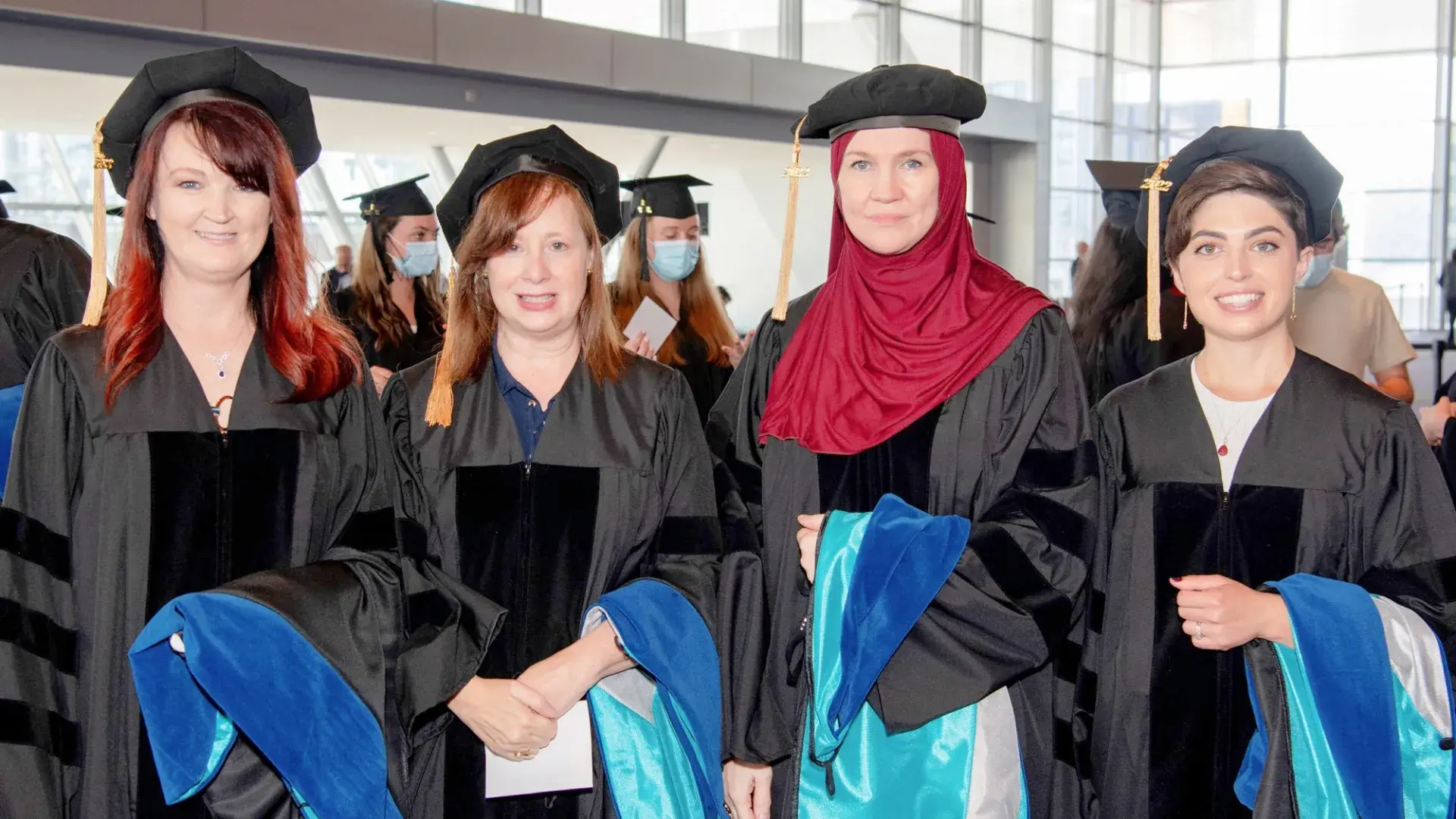
When the PhD in Health Professions Education was launched in 2019, the program’s goals for health care professionals included providing them with skills in developing and implementing educational research, designing programs, leading change and innovation, and contributing to interprofessional education – all designed to improve health outcomes.
Judging by its first four graduates – Dr. Maura Polansky, Dr. Cynthia Mosher, Dr. Brittany (Alex) Morton, and Dr. Dawn Wawersik, the results are exactly what Chair Roger Edwards had envisioned.
“It’s only been a few months since they graduated, but they’re already making an impact where they work and beyond,” said Dr. Edwards.
The PhD program incorporates and builds on the Institute’s Master of Science in Health Professions Education by providing part-time or full-time blended learning with outcomes that are commensurate with a research-based doctorate.
“They’re utilizing their doctoral research and training to make meaningful contributions to the field of health professions education and advancing their careers,” said Edwards.
For Polansky, her current position as a visiting adjunct associate professor in the Department of Medical Education at the University of Illinois, Chicago is just the latest in a long line of positions at prestigious universities that include the George Washington University School of Medicine and Health Sciences and the University of Texas MD Anderson Cancer Center. She also recently completed a six-month visiting scholar appointment at the Institute.
A physician assistant, Polansky had known of the Institute’s master’s degree in simulation-based education but had been unfamiliar with its focus on interprofessional education which aligned closely with her own teaching and research interests. “The curriculum provides a nice mix of theory and skills in advanced research methods, and provides an opportunity to expand ones’ understanding of the landscape of health professions education,” she said. “I have developed a more critical perspective on educational innovation and scholarship which I am now applying to my teaching, research, and service."
Mosher has gone international with her PhD degree, having been hired by the Institute as the part-time Assistant Course Director and Simulation Educator for the IHP’s health professions master’s program at the College of Medicine at Alfaisal University in Saudi Arabia. It’s a bit of a homecoming for Mosher, as she graduated from the Middle East school in 2017 with a medical degree.
“Coming from a work environment that focuses on the physician, it was refreshing and eye-opening to work with and learn from a range of individuals with different professional backgrounds,” said Mosher, who also continues as an Assistant Director and Simulation Director at Alfaisal. “My IHP education has served as a platform for me to carry forward what I learned to put into practice in my work here in Saudi Arabia and in working with others from around the globe. Plus, it has helped me establish relationships with individuals I have admired from afar and who now welcome me to work with them as I move forward in my work.”
Morton was already deeply entrenched in simulation-based health professions education as an educational specialist at Oxford Medical Simulation. It was while she and her classmate Mosher were completing their master’s in healthcare simulation at the University of Alabama Birmingham that she heard about the Institute’s doctoral program offering a simulation-based education track, which she said was the only one to offer this area of focus.
After meeting with Associate Chair Dr. Janice Palaganas, from whom Morton discovered the program’s innovative mindset, cutting-edge research, and courses that would allow her to actively integrate at work what she learned, she was hooked.
“I knew it was a perfect fit because it would allow me to continue my goal of becoming a leader in the field,” said Morton, who is a nurse practitioner.
In addition to working with educators across the country to incorporate virtual reality into their curricula, she will be using her education later in October as co-chair of the Healthcare Distance Simulation Collaborative’s 3rd Annual Healthcare Distance Simulation Summit.
Wawersik was considering getting a second master’s in simulation when she heard about the Institute’s PhD program and discovered leaders such as Palaganas and Dr. Suzie Kardong-Edgren are on the faculty, which she said was a major draw.
The head of the Nursing Simulation Program at Henry Ford College in Dearborn, MI, Wawersik described herself as someone who thinks outside the box. It is a trait she said is not always appreciated, she said, but it was embraced by her classmates and faculty.
“That’s my innovative and creative side that will help move my field forward through scholarly work and innovation,” said the nurse practitioner. “Most importantly, I learned how to do that.”
Wawersik also pointed to the program’s allowance of time to produce publish-ready research papers while completing projects throughout the program.
“This was very helpful to experience the painstaking process of publishing first-hand with experienced faculty guiding me,” she said, adding that she now helps other faculty at Henry Ford pursue their research.
With another 37 PhD and 14 MS-PhD students pursuing their areas of scholarship, Edwards said the Department of Health Professions Education is poised to be a notable contributor to the field of health professions education in the years ahead.
Do you have a story the Office of Strategic Communications should know about? If so, email ihposc [at] mghihp.edu (subject: Story%20idea) (ihposc[at]mghihp[dot]edu).
